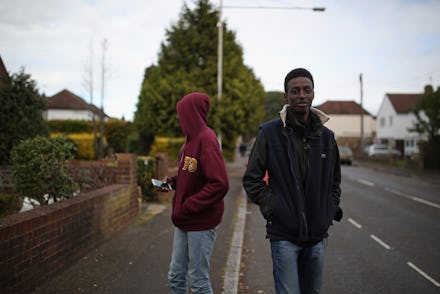Refugees Arriving in the UK Are Being Forced to Wear Red Wristbands at All Times

Authorities have issued refugees in the city of Cardiff, the capital of Wales, mandatory red wristbands that "they must wear at all times," reports the Guardian.
According to the Guardian's report, asylum-seekers being resettled in the region by a contract company named Clearsprings Ready Homes are told taking off the wristbands will result in them being denied food.
Much like a similar controversy that emerged in recent weeks after asylum-seekers in the English town of Middlesborough complained a subcontractor painted each of their homes' doors red, the migrants told the Guardian the wristbands exposed them to harassment and abuse by Cardiff's less welcoming citizens.
"On the road we had to walk down there is often heavy traffic," Eric Ngalle, a former resident at the city's Lynx House for new arrivals, told the paper. "Sometimes drivers would see our wristbands, start honking their horns and shout out of the window, 'Go back to your country.' Some people made terrible remarks to us."
Another person who lived at Lynx House, Sudanese human rights activist Mogdad Abdeen, told the Guardian, "We are made to feel that we are second-class humans. People in Lynx House are scared of meeting new people in case they see the wristband and give them problems."
As part of a larger international effort to absorb the more than one million refugees from war-torn Syria and Iraq and elsewhere that arrived in Europe in 2015, the U.K. has committed to admitting 20,000 migrants by the year 2020 — a total criticized as low by many in the British press, according to Reuters.
It's easy to see why resettled people might be wary of the wristbands or fear they may expose them to harm.
Not only do they seem reminiscent of other dark times throughout history when people were forced to wear identification, anti-refugee sentiment across the European continent has grown since Islamic State-linked terrorist attacks in Paris in November killed 130 people there.
In a 2014 op-ed in the Guardian, British writer Richard Seymour argued growing mass opposition to immigration throughout the U.K. was indicative of a "hardening anti-immigrant consensus ... the dominant sentiment of this racism is resentment. People are convinced that immigrants have taken something from them."
A YouGov poll released in late November, following the Paris attacks, found "a sharp decrease in the willingness of British people to accept refugees fleeing the conflict in Syria, with the percentage saying we should accept none at all almost doubling from 14% in September to 26%."